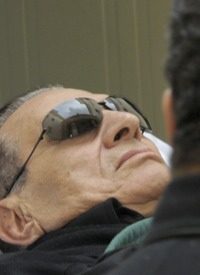
During court proceedings January 4, reported the Associated Press, “chief prosecutor Mustafa Suleiman said the defendants clearly authorized the use of live ammunition and a shoot-to-kill policy against peaceful protesters. He also complained that the prosecution had to launch its own probe after security authorities ignored the prosecution’s requests for help in the inquiry. Prosecutors interviewed hundreds of witnesses, physicians, and police officers to build [their] case.”
Specifically, Suleiman charged that on January 27, two days after large-scale protests erupted in Cairo and elsewhere in Egypt, Mubarak and his security heads made the decision to use armed force against the protesters in an attempt to put a stop to the opposition. According to another prosecutor, Mustafa Khater, “special police forces armed with automatic rifles targeted the heads, chests and eyes of protesters,” reported the AP.
Prosecutors also showed television news video of police loading their weapons with live rounds, along with police and emergency vehicles running down protesters. “One video showed a police officer perched on top of a police car and killing a protester with a gunshot to the head,” reported AP.
Suleiman told the court that the “defendants before you in the cage are the actual instigators and are the ones who gave police officers the order to shoot,” adding that the prosecution had evidence the regime had employed “thugs” to pelt protesters with rocks in order to incite them into a violent response. The police then used the protesters’ response of self-defense against the rock-throwers as justification to respond with armed force. “The protesters were peaceful, and it was the police that started firing on them,” he said.
Bloomberg News reported that the prosecution’s presentation coincided with a third round of voting for Egypt’s lower house of parliament, which is dominated by Islamists. “The Muslim Brotherhood’s Freedom and Justice Party, which led in the first two rounds of voting, said early today that its bloc won 35 percent of party-list votes so far announced for the latest phase,” reported Bloomberg.
There appears to be a growing opposition among Egyptians to the military leaders who took over after Mubarak’s ouster, and who insist they won’t relinquish power until a new President is elected by the end of June.
The AP reported that reform-minded activists “have been pointing to what they see as mounting signs of a confluence of interests between the Brotherhood and the ruling generals. They fear their understanding could lead to shelving reforms for greater democracy they hoped for after Mubarak’s fall.”
Many who have been calling for justice in the killings of protesters fear that Mubarak may ultimately dodge the death penalty if he is convicted. World magazine noted that a conviction “would be followed by a possibly lengthy appeals process that the ailing Mubarak’s lawyer would likely draw out, and Egypt’s new rulers — the military — have the power to veto a death sentence.”
Observers note that it is also possible that Mubarak could actually be cleared on the charges in the deaths of the protesters, and instead be convicted and imprisoned for corruption during his rule. World magazine reported that the corruption charges “emanate from his association with friend and business tycoon Hussein Thabet, who allegedly sold Mubarak and his family five luxury villas at a fraction of their market price in return for Thabet landing a lucrative deal to export natural gas to Israel.”
There has been speculation that the judge in the case is seeking to press ahead with the remainder of the trial, including testimony from the family of victims followed by the defense’s case, in order to seal a verdict by January 25, the one-year anniversary of the protests.
Photo of Hosni Mubarak: AP Images



